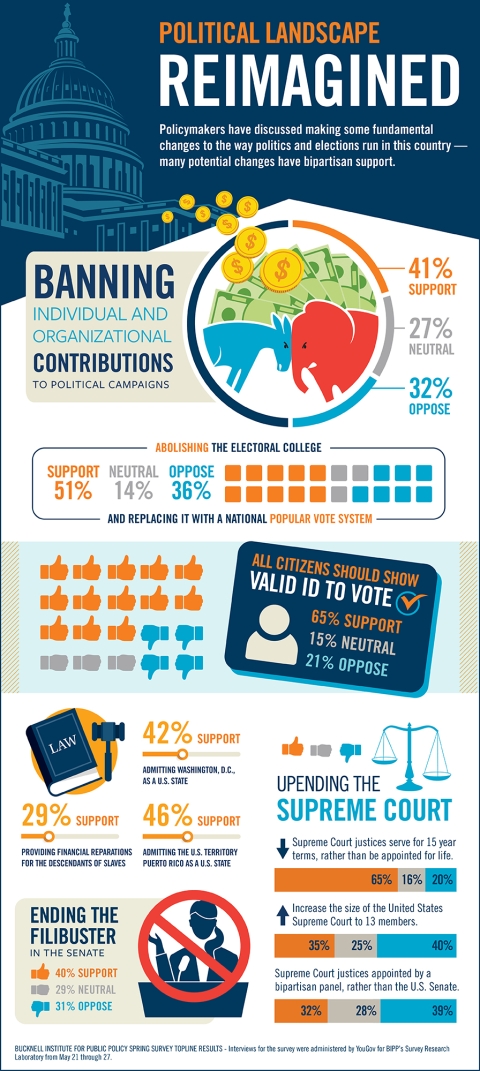
Bucknell Poll Finds Support for Voter ID Laws, Supreme Court Term Limits
June 29, 2021
Professor Chris Ellis ’00, political science, is director of the Bucknell Survey Research Laboratory. Photo by Emily Paine, Communications

A new nationally representative survey from the Bucknell Institute for Public Policy (BIPP) shows that there is substantial support among Americans for universal voter ID laws and having Supreme Court justices serve terms rather than life appointments. But among other fundamental changes to the way elections are run in the United States, most ideas were found to be either unpopular overall or supported only along expected party lines.
Among the 1,000 respondents, approximately 65% support requiring all citizens to show a valid ID in order to vote, while 21% oppose and 15% neither support nor oppose such a requirement. 65% were also in favor of having Supreme Court justices serve for 15-year terms rather than be appointed for life, compared to 20% who oppose term appointments and 16% who have no opinion. Responses to both questions largely broke along party lines, with 96% of Republicans vs. 42% of Democrats supporting the voter ID requirement and 80% of Democrats and 42% of Republicans supporting term appointments for Supreme Court justices.
"Universal voter ID has pretty consistent majority support across all kinds of demographic categories: white, Black and Hispanic; young, middle-age and old; and across all categories of income distribution," says Professor Chris Ellis '00, political science, co-director of BIPP and director of the Bucknell Survey Research Laboratory.
Other Supreme Court-related changes weren't as popular. Having Supreme Court justices appointed by a bipartisan panel rather than the U.S. Senate received 39% support and 32% opposition. Increasing the size of the Supreme Court to 13 members saw 35% support and 40% opposition, with low support from independents and Republicans at 24% and 9% respectively.
"Having term-limited justices is more popular than other options — adding new justices, or having justices appointed in a bipartisan way — to change the court," Ellis says. "The fact that term limits are in all likelihood unconstitutional doesn't prevent the public from thinking that life tenure for justices is a bad idea. Adding justices, on the other hand, is likely to be a loser for Democrats, even if they could do it, since independents hate the idea."
In the wake of two recent presidential elections in which the popular-vote winner did not win the Electoral College (2000, 2016), the hotly debated question of abolishing the Electoral College and replacing it with a national popular vote system also received majority support at 51% overall, with 36% who oppose the idea. The survey revealed that 80% of Democrats supported the idea compared to 40% of Republicans, an outcome the researchers anticipated since both popular vote winners who lost the White House were Democratic candidates.
The nation was largely split on banning individuals and organizations from contributing to political campaigns, with 41% supporting it, 32% opposing it and 27% neither supporting nor opposing it. The support was pretty consistent across party lines with 42% of Democrats, 44% of independents and 33% of Republicans supporting the idea respectively.
Other election-reform proposals were less popular. Just 19% of respondents supported allowing 16- and 17-year-olds the right to vote, while 15% supported raising the age required to legally vote to 25. The idea of weighting the votes of young Americans (those under 35) more heavily than older Americans (those over 65) received even lower support at 9%, while only 5% supported giving extra votes in national elections to parents based on the number of children that they have.
"Changes to tinker with who gets to vote and how voters are counted and/or weighted are very unpopular," Ellis says. "The public's appetite for truly radical changes in the electoral system is very low."
The survey also found that Americans are more supportive of Puerto Rico statehood (46%) than District of Columbia statehood (42%), and 40% of respondents supported eliminating the filibuster, including 65% of Democrats compared with 9% of Republicans.
Interviews for the survey were administered by YouGov for BIPP's Survey Research Laboratory from May 21 through 27.

